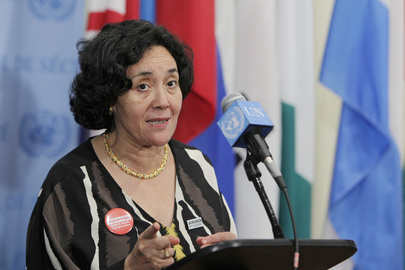States Hold the Primary Responsibility of Protecting Children was the resounding theme at an open dialogue session held at the United Nations New York headquarters on Monday, during the report of the Secretary-General on the responsibility to protect children across the globe.
Leila Zerrougui, Secretary-General Ban Ki-Moon’s Special Representative for Children and Armed Conflicts spoke on his behalf expressing total dismay at the unashamed disregard for human life shown by extremist armed groups.
“We cannot afford impunity in the face of such grave violations of international law that in some cases may amount to war crimes,” said Ms. Zerrougui.
The Special Representative’s presentation occurred exactly six months after the launch of UNICEF’s [United Nation Children’s Fund] of the joint campaign Children, Not Soldiers, with one aim: “no children in Government forces by the end of 2016.”
Since all civil society organizations, states, regional organizations and international institutions have a role to play in the Responsibility to Protect [RtoP] process, Italy took its part in the event. Ambassador Inigo Lambertini voiced increasingly strong support for RtoP and expressed commitment in promoting the international law.
“We align ourselves with statements delivered by the European Union and the Group of Friends of RtoP,” said. He added that this year’s Report of the Secretary-General articulated a recollection of the reason for RtoP as well as its three foundational pillars. “In an interactive, interdependent, and mutually-supportive way, this is how RtoP can truly help the international community in fulfilling the collective responsibility to protect populations from atrocious crimes,” he added.
Hervé Ladsous, Under-Secretary-General for the Department of Peacekeeping Operations [DPKO], stressed that coordination of action with international child protection partners is instrumental in addressing the plight of children.
In its support of the SG’s additional initiative, Framework of Analysis which aims to disseminate early-warning mechanisms, Mr. Lambertini mentioned that Italy has also been taking its own steps.
Through Italian Development Cooperation and UN Agencies programs, Italy has developed special projects in order to help strengthen the SG’s aim for the inhibition of mass atrocity crimes. These projects will go hand-in-hand with the UN’s new initiative which will provide specific guidelines in order to properly identify and effectively achieve actions in critical RtoP situations.
“We are fully committed in assisting civilian populations which face humanitarian and war-triggered social crisis. Therefore, I am particularly pleased in announcing that next month we will be holding a joint event to introduce a completely updated version of the Framework of Analysis,” Mr. Lambertini said.
During the dialogue session on Monday, a senior United Nations official told the Security Council that the appalling multiplication of crises affecting children since the beginning of 2014 is creating unprecedented challenges that overshadow progress to date to protect them from the impact of war.
While the report shows that the Islamic State of Iraq and the Levant [ISIL] tasks young boys, even 13 – year-olds, to carry weapons, guard strategic locations or arrest civilians, it also uses other children as suicide bombers – which has either killed or brought serious harm to over 700 children so far this year.
Boko Haram has abducted over 200 girls; has attacked schools, leading to the death of at least 100 students, while continuing to kidnap other children. Over 500 children were killed and more than 1,300 injured in Gaza.
Special Envoy of the UN Educational, Scientific and Cultural Organization [UNESCO] for Peace and Reconciliation and an Academy award-winning actor, Forest Whitaker, who had just [earlier in the day] returned from South Sudan, presented his findings on children in war situations. As he described scenes where thousands of civilians [many of them children] sought shelter in over-crowded camps, he expressed feelings that there seems to be no end in sight.
“Perhaps worst of all, [is when] I saw child soldiers wearing military uniforms and carrying guns,” Mr. Whitaker said. “We may take a child out of an army, but unless we do more for him – help him re-enter society, enroll him in a good school, teach him a useful trade – we have not set him free.”












